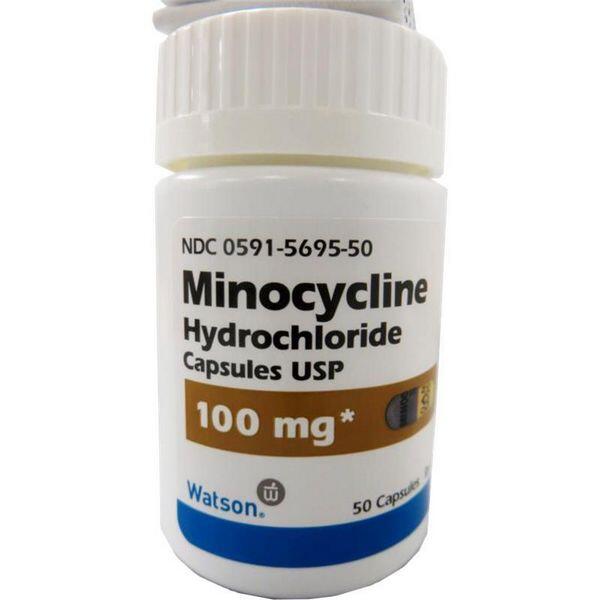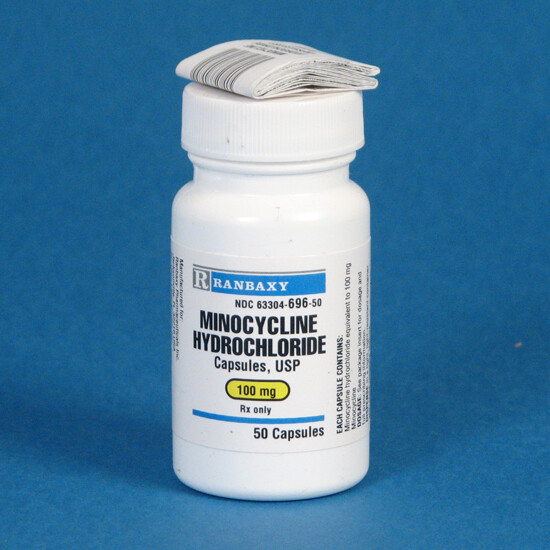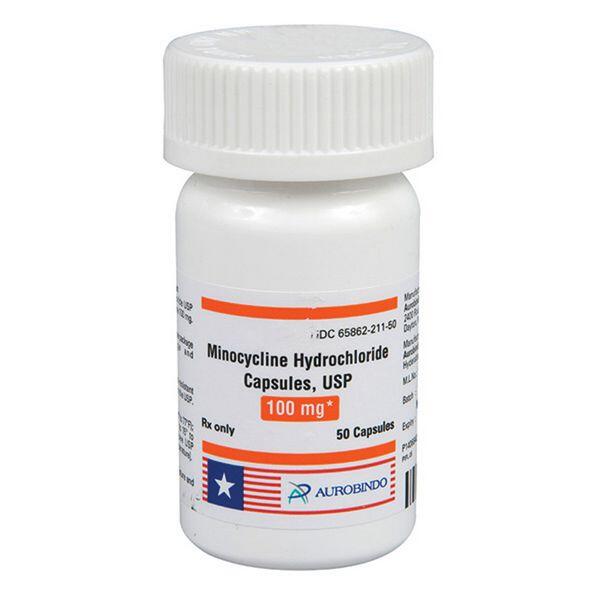Minocycline Hydrochloride
Minocycline is a semisynthetic tetracycline antibiotic derived from tetracycline.
Dosage and Administration
Reconstitution and Administration
Minocycline hydrochloride usually is administered orally. When oral therapy is not feasible, the drug may be given by IV infusion; however, oral therapy should replace IV therapy as soon as possible. If minocycline is given IV, the risk of thrombophlebitis should be considered.
Minocycline hydrochloride capsules, pellet-filled capsules, or oral suspension may be administered with or without food. To reduce the risk of esophageal irritation and ulceration, minocycline hydrochloride capsules or pellet-filled capsules should be administered with adequate amounts of fluid and probably should not be given at bedtime or to patients with esophageal obstruction or compression.
Minocycline hydrochloride sterile powder is reconstituted by adding 5 mL of sterile water for injection to the vial labeled as containing 100 mg of minocycline to provide a solution containing 20 mg of the drug per mL. Each 100 mg of minocycline must be further diluted prior to administration with 500 mL to 1 liter of compatible IV infusion fluid to provide solutions containing 100-200 mcg of minocycline per mL. Diluted IV solutions should be administered immediately after preparation and are usually infused over 6 hours.
Dosage
Dosage of minocycline hydrochloride is expressed in terms of minocycline and is identical for either route of administration. The usual adult oral or IV dosage of minocycline is 200 mg initially followed by 100 mg every 12 hours.
Alternatively, if more frequent doses are preferred, the manufacturers states that adults may receive 100-200 mg of minocycline capsules initially followed by 50 mg 4 times daily. The usual oral or IV dosage of minocycline for children older than 8 years of age is 4 mg/kg initially followed by 2 mg/kg every 12 hours.
Asymptomatic Meningococcus Carriers
To eliminate meningococci from the nasopharynx of asymptomatic Neisseria meningitidis carriers in situations in which the risk of meningococcal meningitis is high, the manufacturers states that 100 mg of oral minocycline should be given every 12 hours for 5 days; however, the US Centers for Disease Control and Prevention (CDC) and the American Academy of Pediatrics (AAP) currently recommend other anti-infective agents (i.e., rifampin, ceftriaxone, ciprofloxacin) for chemoprophylaxis in close contacts of individuals with invasive meningococcal disease.
Leprosy
For the treatment of multibacillary leprosy in adults who cannot receive rifampin because of adverse effects, intercurrent disease (e.g., chronic hepatitis), or infection with rifampin-resistant Mycobacterium leprae, the World Health Organization (WHO) recommends supervised administration of a regimen of clofazimine (50 mg daily), ofloxacin (400 mg daily), and minocycline (100 mg daily) given for 6 months, followed by a regimen of clofazimine (50 mg daily) and minocycline (100 mg daily) given for at least an additional 18 months.
For the treatment of multibacillary leprosy in adults who will not accept or cannot tolerate clofazimine, the WHO recommends supervised administration of a once-monthly rifampin-based multiple-drug regimen (ROM) that includes rifampin (600 mg once monthly), ofloxacin (400 mg once monthly), and minocycline (100 mg once monthly) given for 24 months.
For the treatment of single-lesion paucibacillary leprosy in certain patient groups, the WHO currently states that adults may receive a single-dose rifampin-based multiple-drug regimen (ROM) that includes a single 600-mg dose of rifampin, a single 400-mg dose of ofloxacin, and a single 100-mg dose of minocycline. For the treatment of single-lesion paucibacillary leprosy in pediatric patients, children 5-14 years of age may receive a single 300-mg dose of rifampin, a single 200-mg dose of ofloxacin, and a single 50-mg dose of minocycline, and children younger than 5 years of age should receive an appropriately adjusted dose of each drug.

Other Mycobacterial Infections
Although the manufacturers state that optimum dosage has not been established, granulomas of the skin caused by Mycobacterium marinum have been successfully treated with 100 mg of oral minocycline every 12 hours for 6-8 weeks. The American Thoracic Society (ATS) has recommended that oral minocycline be given in a dosage of 100 mg twice daily for at least 3 months for the treatment of cutaneous M. marinum infections and states that a minimum of 4-6 weeks of therapy is necessary to determine whether or not the infection is responding.
Gonorrhea and Associated Infections
The manufacturers state that uncomplicated gonorrhea (other than urethritis and anorectal infections in men) may be treated with 200 mg of oral minocycline initially followed by 100 mg every 12 hours for a minimum of 4 days; follow-up cultures should be done within 2-3 days after completion of therapy. For the treatment of uncomplicated gonococcal urethritis in adult males, the manufacturers state that the recommended dosage of oral minocycline is 100 mg every 12 hours for 5 days. However, tetracyclines are not included in current CDC guidelines for the treatment of any form of gonorrhea, and doxycycline is the preferred tetracycline for the presumptive treatment of coexisting chlamydial infections in patients with gonorrhea.
Syphilis
The manufacturers state that the usual dosage of oral minocycline may be given for 10-15 days for the treatment of syphilis; close follow-up and laboratory tests are recommended. However, parenteral penicillin G is the drug of choice for all stages of syphilis and doxycycline or tetracycline hydrochloride are the tetracyclines recommended by the CDC for the treatment of primary, secondary, latent, or tertiary syphilis in nonpregnant adults, adolescents, and children 8 years of age or older who are hypersensitive to penicillin.
Chlamydial and Mycoplasmal Infections
For the treatment of nongonococcal urethritis caused by C. trachomatis or Ureaplasma urealyticum, the manufacturers state that adults can receive oral minocycline in a dosage of 100 mg every 12 hours for at least 7 days. However, doxycycline is the tetracycline recommended by the CDC for the treatment of nongonococcal urethritis.
Pleural Effusions
When used intrapleurally as a sclerosing agent to control pleural effusions associated with metastatic tumors, 300 mg of minocycline reportedly has been diluted with 40-50 mL of 0.9% sodium chloride injection and instilled into the pleural space through a thoracostomy tube, followed by clamping of the tube and subsequent removal of the fluid.
Cholera
For the treatment of cholera in conjunction with fluid and electrolyte replacement, an initial 200-mg oral dose of minocycline has been given followed by 100-mg oral doses every 12 hours for 48-72 hours.

Nocardiosis
For the treatment of nocardiosis, the usual dosage of oral minocycline has been given in conjunction with a sulfonamide for 12-18 months. Acne In the adjunctive treatment of inflammatory acne vulgaris unresponsive to oral tetracycline hydrochloride or oral erythromycin, 50 mg of minocycline has been given orally 1-3 times daily. For information on topical tetracycline therapy in the treatment of inflammatory acne vulgaris.
Rheumatoid Arthritis
When used in the management of rheumatoid arthritis, adults have received oral minocycline in a dosage of 100 mg twice daily. A benefit may be evident 1-3 months after initiation of minocycline therapy.
Dosage in Renal Impairment
In patients with renal impairment, doses and/or frequency of administration of minocycline should be decreased in response to the degree of impairment. One manufacturer states that total daily dosage of oral minocycline should not exceed 200 mg in patients with impaired renal function.
Cautions
Adverse CNS effects (e.g., vestibular reactions) occur more frequently with minocycline than with other currently available tetracyclines. The true incidence of these adverse effects has not been determined. Previously, vestibular symptoms were reported to occur in up to 21% of patients treated with minocycline. However, recent studies indicate that these reactions may occur in 30-90% of patients treated with usual dosages of minocycline. For a more complete discussion of these and other cautions associated with the use of minocycline.
Pharmacokinetics
In all studies described in the Pharmacokinetics section, minocycline was administered as the hydrochloride salt.
Absorption
Approximately 90-100% of an oral dose of minocycline hydrochloride is absorbed from the GI tract in fasting adults. Following oral administration of minocycline powder- or pellet-filled capsules in fasting adults with normal renal function, peak serum concentrations of the drug are attained within 1-4 hours and average 2-3.5 mcg/mL following a single 200-mg dose. In one study in adults with normal renal function given an initial 200-mg oral dose of minocycline as powder-filled capsules followed by 100-mg oral doses every 12 hours, steady-state serum concentrations of minocycline averaged 2.3-3.5 mcg/mL.
When administered as pellet-filled capsules to healthy adults immediately following a standardized meal containing dairy products, peak plasma minocycline concentrations reportedly were slightly decreased (11.%) and delayed by approximately 1 hour compared with values in healthy fasting adults; however, the extent of absorption (as represented by area under the plasma concentration-time curve) was similar in fed and fasting individuals.
GI absorption of minocycline hydrochloride from oral dosage forms other than pellet-filled capsules may be reduced up to 20% by food and/or milk; however, the effect is not usually clinically important. Because tetracyclines readily chelate divalent or trivalent cations including aluminum, calcium, iron, and magnesium, concurrent oral administration of antacids or other drugs containing these cations may also decrease oral absorption of minocycline hydrochloride.
Following IV infusion over 1 hour of 200 mg of minocycline in a group of adults with normal renal function, serum concentrations of minocycline averaged 4.2 mcg/mL immediately after completion of the infusion, 2 mcg/mL at 6 hours, and 1.4 mcg/mL at 12 hours.
Elimination
The serum half-life of minocycline is 11-26 hours in adults with normal renal function. In one study, the half-life was reported to be about 17 hours after a single dose and 21 hours after multiple doses. In a limited number of patients with hepatic dysfunction, the serum half-life of minocycline reportedly ranged from 11-16 hours.
Although results of studies using minocycline in patients with renal impairment are conflicting, most studies indicate that the serum half-life of the drug is not significantly affected by alterations in renal function.
In patients with severe renal impairment, the serum half-life of minocycline is generally reported to be 12-30 hours following single or multiple doses. In patients with normal renal function, approximately 4-19% of a single oral or IV dose of minocycline is excreted in urine and 20-34% is excreted in feces within 72 hours as active drug. Some studies indicate that minocycline, unlike other currently available tetracyclines, is partially metabolized to at least 6 metabolites.

Chemistry and Stability
Chemistry
Minocycline is a semisynthetic tetracycline antibiotic derived from tetracycline. Minocycline is commercially available as the hydrochloride salt in oral powder- or pellet-filled capsules, an oral suspension, or sterile powder. Minocycline hydrochloride occurs as a yellow, crystalline powder and is soluble in water and slightly soluble in alcohol. Following reconstitution of sterile minocycline hydrochloride with sterile water for injection, solutions have a pH of 2-2.8.
Stability
Minocycline hydrochloride capsules should be stored at a controlled room temperature of 15-30°C105 and minocycline hydrochloride pellet-filled capsules should be stored at a controlled room temperature of 20-25°C. These preparations should be protected from light, moisture, and excessive heat. Minocycline hydrochloride oral suspension should be stored at 20-25°C and should not be frozen.
Minocycline hydrochloride for injection should be stored at a controlled room temperature of 15-30°C, and protected from light. Following reconstitution of sterile minocycline hydrochloride with sterile water for injection, solutions containing 20 mg of minocycline per mL are stable for 24 hours at room temperature. Minocycline hydrochloride is compatible with the following IV infusion fluids: 0.9% sodium chloride, 5% dextrose, 5% dextrose and 0.9% sodium chloride, Ringer’s, or lactated Ringer’s. Although minocycline is compatible with Ringer’s injection and lactated Ringer’s injection, the drug should not be mixed with other IV infusion fluids containing calcium because precipitation may occur.
Preparations
Buy cheap Minocin 50mg/100mg price without a prescription
Minocycline Hydrochloride Oral Capsules 50 mg (of minocycline) Vectrin®, Medicis 100 mg (of minocycline) Vectrin®, Medicis Capsules, pellet- 50 mg (of minocycline) Minocin®, filled Wyeth 100 mg (of minocycline) Minocin®, Wyeth Suspension 50 mg (of minocycline) per 5 Minocin®, (with alcohol 5% mL parabens propylene glycol and sodium sulfite) Wyeth Tablets, film 50 mg (of minocycline) Dynacin®, coated Medicis 75 mg (of minocycline) Dynacin®, Medicis 100mg (of minocycline) Dynacin®, Medicis Parenteral For injection, for 100 mg (of minocycline) Minocin® Intravenous, IV infusion only Wyeth
| Dosage forms of Minocycline: | |||
|---|---|---|---|
| Apo-Minocycline 100 mg Capsule | Minocycline 100 mg Capsule | Mylan-Minocycline 100 mg Capsule | Novo-Minocycline 100 mg Capsule |
| Pms-Minocycline 100 mg Capsule | Ratio-Minocycline 100 mg Capsule | Sandoz Minocycline 100 mg Capsule | Minocin 100 mg Capsule |
| Minocycline HCl 50 mg capsule | Minocycline 75 mg capsule | Minocycline HCl 75 mg capsule | Minocycline hcl 50 mg tablet |
| Minocycline HCl 100 mg capsule | Dynacin 50 mg capsule | Minocycline hcl 75 mg tablet | Minocin 50 mg capsule |
| Minocin 50 mg pelletized cap | Minocycline hcl 100 mg tablet | Dynacin 75 mg capsule | Dynacin 50 mg tablet |
| Minocin 100 mg pelletized cap | Minocin 100 mg capsule | Dynacin 75 mg tablet | Dynacin 100 mg tablet |
| Minocycline HCl 135 mg 24 Hour tablet | Minocycline HCl 45 mg 24 Hour tablet | Minocycline hcl powder | Solodyn er 115 mg tablet |
| Solodyn er 135 mg tablet | Solodyn er 45 mg tablet | Solodyn er 65 mg tablet | Solodyn er 90 mg tablet |
| Solodyn 135 mg 24 Hour tablet | Solodyn 45 mg 24 Hour tablet | Solodyn 65 mg 24 Hour tablet | Solodyn 90 mg 24 Hour tablet |
| Arestin 1 mg microsphere | Minocin 100 mg vial | Minocin kit 50 mg combo | Minocin kit 100 mg combo |
| Minocin PAC 100 mg Kit Box | Apo-Minocycline 50 mg Capsule | Minocycline 50 mg Capsule | Mylan-Minocycline 50 mg Capsule |
| Novo-Minocycline 50 mg Capsule | Pms-Minocycline 50 mg Capsule | Ratio-Minocycline 50 mg Capsule | Sandoz Minocycline 50 mg Capsule |
| Minocin 50 mg Capsule | |||
Synonyms of Minocycline:
Minocycline
How can i get Minocycline online over the counter?
You can buy Minocycline OTC in online drugstore with low cost.
Therapeutic classes of Minocycline:
Anti-Bacterial Agents, Tetracyclines
Delivery
Australia, Canada, Mexico, New Zealand, USA, Europe [Belgium, France, Norway, Holland, Ireland, Spain, Switzerland, Great Britain (UK), Italy] and etc.


 (7 votes, average: 4.43 out of 5)
(7 votes, average: 4.43 out of 5)













































Is there any brand of minocycline or dose that does not contain iron (ferric/ferrous salts) ??